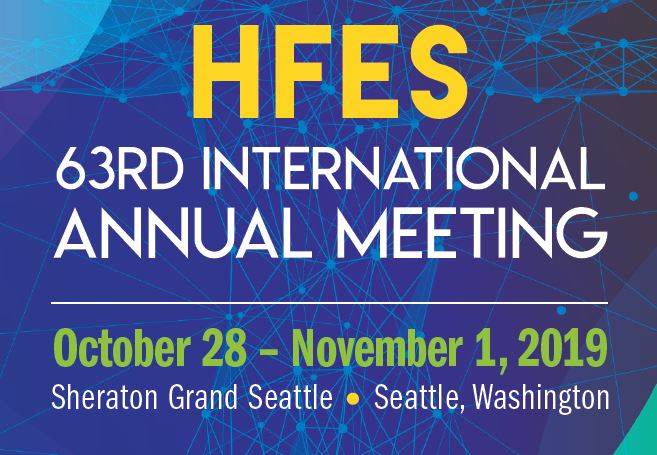
At the end of October, TARG presented two papers at the 63rd Human Factors and Ergonomics Society (HFES) Annual Meeting in Seattle, Washington (October 28th-November 1st, 2019). Steven Mallam attended HFES, which is one of the largest conferences for Human Factors researchers, educators, practitioners and policy makers, hosting approximately 1500 attendees and 600 technical presentations.
Steven presented two papers co-authored with Salman Nazir and Jørgen Ernstsen related to TARG’s Virtual Reality Project (InnoTraining) and safety climate in shipping:
“Incidental Memory Recall in Virtual Reality: An Empirical Investigation”
Jørgen Ernstsen, Steven C. Mallam, & Salman Nazir
ABSTRACT: Modern virtual reality technologies increase the immersive experience for users. Increased immersivity may affect how users perceive, internalize, and thus, recall information about the virtual environment and experience compared to traditional mediums, such as desktop simulations. One critical aspect of recalling information is incidental memory, which refers to the ability for people to recall information they were unaware was relevant for evaluation. This paper investigates the differences of incidental memory recall between (i) immersive virtual reality and (ii) traditional desktop systems. Fifty-two participants completed a series of tasks within identical virtual environments of the two systems and completed an incidental memory recall questionnaire testing their recall of elements within the virtual world. Results found no significant difference in incidental memory recall between immersive virtual reality and traditional desktop conditions. However, when controlling for gaming experience and gender effects significant differences between groups were found.
“Safety in Shipping: Investigating Safety Climate in Norwegian Maritime Workers”
Steven C. Mallam, Jørgen Ernstsen & Salman Nazir
ABSTRACT: Working at sea places individuals in an inherently dangerous environment for extended periods, exposing them to unique risks not found in land-based industries. Safety-critical socio-technical systems demand an inherent organizational safety culture for reliable and safe operations. Safety climate acts as a mediating factor between the broader organizational climate and safety behavior of individuals and teams. This paper investigates safety climate of individuals working at sea. Two hundred persons (47.3 yrs ±12.9; 175 males, 25 females) working as seafarers (n=132) and onboard service staff (n=68) with Norwegian maritime companies completed an online safety climate questionnaire. Results indicate that maritime workers generally have lower perceptions of safety within their organizations in comparison to other industries. Furthermore, certified seafarers have lower perceptions of safety then onboard service staff, who have lower restrictions to working at sea, and generally less maritime safety education and training.
For more information about the conference and publications please see: HFES2019